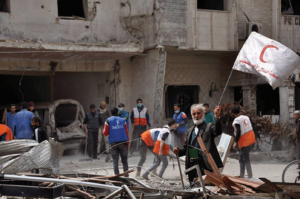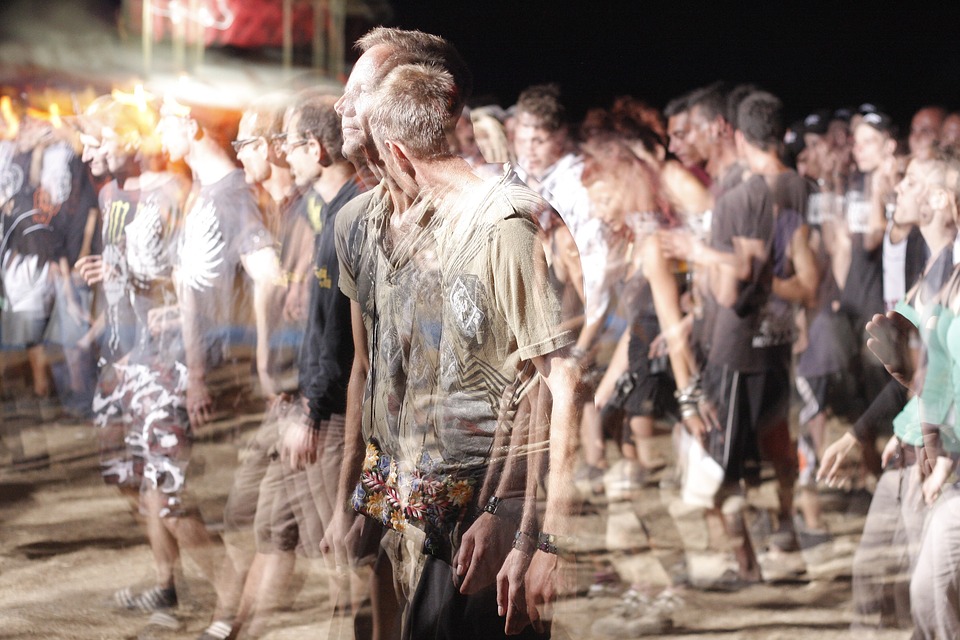
Photo du camp de Yarmouk. Dr Moawia.
Speaking with you as Dr. Mohawia, I’m a specialist in Urology and genitourinary disorders since April 2012. I live in Yarmouk camp, once the largest community market in Syria. It’s in the capital Damascus and was built in 1951 as a camp for Palestinian refugees. 5 years ago, about half a million people lived in it. Now, there are only a few thousand, as most of its inhabitants moved to neighboring areas or left the country. Yarmouk camp has been under total siege from the 15 of July 2013 till this date. These conditions oblige me to work as a general practitioner, treating people with diseases other than urological ones. What I’m trying to do with this presentation is to brief you with an overview of the situation here, concentrating on medical aspects.
I’m often asked, what exactly do you need? I once wrote, trying to answer the question as briefly as possible, we need everything to be anything! No one in Yarmouk, including me of course, has the least basic right as a human being. Am I talking about the right to liberty? Freedom of speech? Freedom of belief? Maybe, but I am talking basically about food, about survival. What is called hunger, we live as starvation. One hundred and seventy seven people died of starvation during the last two months of 2013 and the first two months of 2014. Most of them were elderlies with chronic disorders like diabetes mellitus and hypertension, or infants, especially new borns who may have a birth weight of no more than 4 pounds (1.8 kg) and whose mothers suffer from malnutrition, preventing them from getting enough quantities of natural milk. Especially since there was, and is still, a severe deficiency in powdered milk. There are those who died of hunger. But all the habitants in here are affected by starvation in all aspects of their health. For weeks their meals may not be more than spiced water and blends that cause many cases of acute renal failure.
To make things worse, water supplies have been cut off for 9 months now. People are forced to drink from wells, which are polluted by sewage. This is causing daily cases of intestinal infections, with protozoaires like entamoeba, histolytica and giardia lamblia. Severe diarrhea worsens existing malnutrition. In addition, oxalate, which this water is rich with, is causing urinary stones. These diseases and others are a real challenge due to severe deficiency in medication.

Photo de l’unique hôpital qui fonctionne encore à Yarmouk. Photo: Dr Moawia.
On the subject of diseases, people are suffering from many chronic and infectious diseases. On the top of the list of chronic ones, we found diabetes mellitus and hypertension. Patients, with almost no treatment for long periods, develop well-known complications of these disorders such as acido cetose, diabetic feet, angaina angor, cardiovascular disease and cerebrovascular accidents. Starvation also causes episodes of severe hypoglycemia that leads to many deaths. I still remember a man in his fifties who we lost because of hypoglycemia. If we had had dextrose syrup, we would have saved him. But, this proved to be a third conditional “if” as we had to watch him dying before our eyes. The unavailability of many basic laboratory and radiology investigations hinders us from diagnosing many diseases and so we stand disabled in front of them. Patients with cancers can’t get their chemo and radiotherapies. Abu Raid was one of them. A seventy year old man who had a prostate carcinoma with pulmonary and vertebral metastasis; he suffered severed pains with dyspnea, deep vein thrombosis and cachexie. After months of symptomatic treatments, and psychological support, we were able to send him to Jordan. Just to die there, in a hospital in Aman, 5 days after admission. While chronic diseases are limited to some people, everyone here is prone to infections.
I’m going to mention some numbers but it’s to be clear that theses are only the cases which have been diagnosed by me since May 2014, as I’ve examined about thirty seven hundred patients since then. I’ve diagnosed seventy-eight communicable cases of typhoid fever. The first of them was on the 12 of July 2014. 20 cases of pertussis tuberculosis, poliomyelitis and three hundred cases of infectious hepatitis A. Many of the victims were children. As it might be expected from unique and extreme conditions like this, the mind is not safe from disorders that invade the body. The most prevalent diseases in Yarmouk camp are psychological ones. Neuroses are the star of the movie. The most common cases of are major depressive disorder, generalized anxiety disorder, obsessive compulsive disorder, phobias and panic attacks. But it (I mean neuroses) may be signs of psychosis.
Amal is a 23 year old young woman, her name means Hope, Esperanza, Nadejna, and it’s Elpius, or the Spirit of hope that we found in the bottom of Pandora’s Jar according to the Greek myth. She came with her mother to my office the first time on the 4 of June 2014. She spent most of the 20 minutes of the meeting speaking with the sphygmomanometer that was on my desk. Nothing in her medical history, she’s a lover of painting and English language, suggested that she would one day develop visual and auditory hallucinations, a distorted perception of reality and acute mood fluctuations. I had to treat her with Risperidone, a schizophrenic drug, for six months, so that she could get herself back. She’s much better now, albeit not completely normal.

Photo de l’unique hôpital qui fonctionne encore à Yarmouk. Photo: Dr Moawia
I’m sorry I’m taking a long time, but I ask your permission to allow me to sum up what we need medically. First of all, we need qualified staff as I’m almost the only physician here and most workers are volunteers. In Yarmouk camp they are used to doctors who practice fields they didn’t originally study. We need surgeons and physicians from all specialisms. Second, medication of all sorts: antibiotics, painkillers, cardiopulmonary drugs, steroidal and non-steroidal anti-inflammatory drugs, nutritional complements, and in brief, all drugs. Third, vaccines, as the camp still sees new births and there are hundred of children in here. Although some organizations provide vaccination campaigns from time to time, this is hardly enough. Fourth, power supplies. Electricity has been cut off for 2 years now. We depend on generators, run with poor and expensive fuel, derived from plastic. We can’t supply the place I work in with electricity more than 3 hours per day. We have to run devices and accomplish all our duties during these hours. Everything to be anything, as I said earlier. I hope that the image is as clear as possible. I thank you very much for the time you have given me, on behalf of me and all the people here. Thank you again.
Dr. Mohawia
The only Doctor of Yarmouk camp, Syria
Amar: a child from Yarmouk wounded three times

Amar: l’enfant de Yarmouk blessé à trois reprises.
Children are particularly the victims of abuses that occur in the Yarmouk camp. This is the story of Ammar Alaa Akla, a 4 year old child. He was wounded three times in the Yarmouk camp. The first time, it was at the bones of the left hand by shrapnel from a shell, three operations have failed. The second time, a sniper shot him in the knee. And the third time, a piece of shrapnel hit his left foot. In addition to operations, Ammar needs today expensive medicines, but his family is short of funds.

Amar: l’enfant de Yarmouk blessé à trois reprises

Amar: l’enfant de Yarmouk blessé à trois reprises







